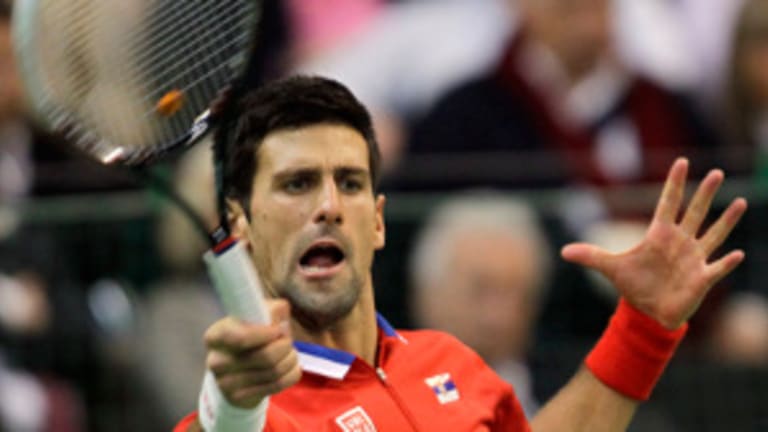BELGRADE, Serbia—With most of the 15,000 fans on hand celebrating your every error, playing the decisive match of a Davis Cup final on foreign soil can make even the most experienced players look as comfortable as prey cornered in a lion’s den.
When Novak Djokovic swept Tomas Berdych, 6-4, 7-6 (5), 6-2, earlier today to score his 24th consecutive victory and level this year’s Davis Cup final at 2-2, the eruption from the Serbian faithful rose to ear-splitting levels.
The Czech Republic faced the furor by unleashing its lion.
Wearing his lucky lion on the front of his blue shirt, Radek Stepanek carried the Czechs on his back. Broken in a nervous opening game, Stepanek settled down and spent the rest of the match mauling Dusan Lajovic with touch and guile, 6-3, 6-1, 6-1, to deliver the Davis Cup championship to the Czech Republic for the second straight year.
Slamming a sky-hook overhead to seal the match, Stepanek raised his arms in the air and then bounced over to the bench, summoning his teammates to join him in a celebratory swarm on the court. Already the oldest man to win a live fifth rubber in the final, the 34-year-old became the first man in the 101-year history of the Davis Cup final to clinch decisive matches in successive years.
“It’s very difficult to find the right words for the emotions I’m going through right now to [win] it twice in a row,” said Stepanek, who joins Henri Cochet and Fred Perry as only the third man to win two live fifth rubbers in a Davis Cup final. “I was really looking forward to it. It was a completely different experience than the last year. I was very focused on what I wanted to do on court. I know the pressure was very big again. There was a lot to play for. And we made history for our country today.”
The second-ranked Djokovic tried to help the Serbs repeat recent history: When Serbia won the 2010 Davis Cup in Belgrade, it rallied from 1-2 deficits on the final day in both its semifinal victory over the Czechs and in the final against France. Djokovic carried a 14-2 career record over Berdych onto court, including a 12-0 mark on his hard courts, and he went to work immediately, earning break points in the fourth and eighth games.
The cumulative pressure of Djokovic’s penetrating returns finally turned a fissure into a full blown crack in the 10th game. Berdych hung tough in fighting off three set points—he had denied nine break points by then—but a backhand error gave Djokovic a fourth set point. Racing up to a net-cord, Djokovic buried a backhand winner, then erupted with a primal scream and furious double fist pump, sealing the 59-minute opener without facing a break point.
Elite players often exhibit anticipation; Djokovic plays with prescience.
“I would point to one thing that I think is the best part of his game, that he has one skill that is very unique: He really can read the game,” Berdych said. “When you have that really big skill it's amazing and he's proving it.”
Tension spiked in the second-set tiebreaker as Djokovic sailed a forehand beyond the baseline and bounced his racquet off the court in frustration, handing Berdych the mini-break and a 5-4 lead. He also incurred a racquet abuse warning in the process.

